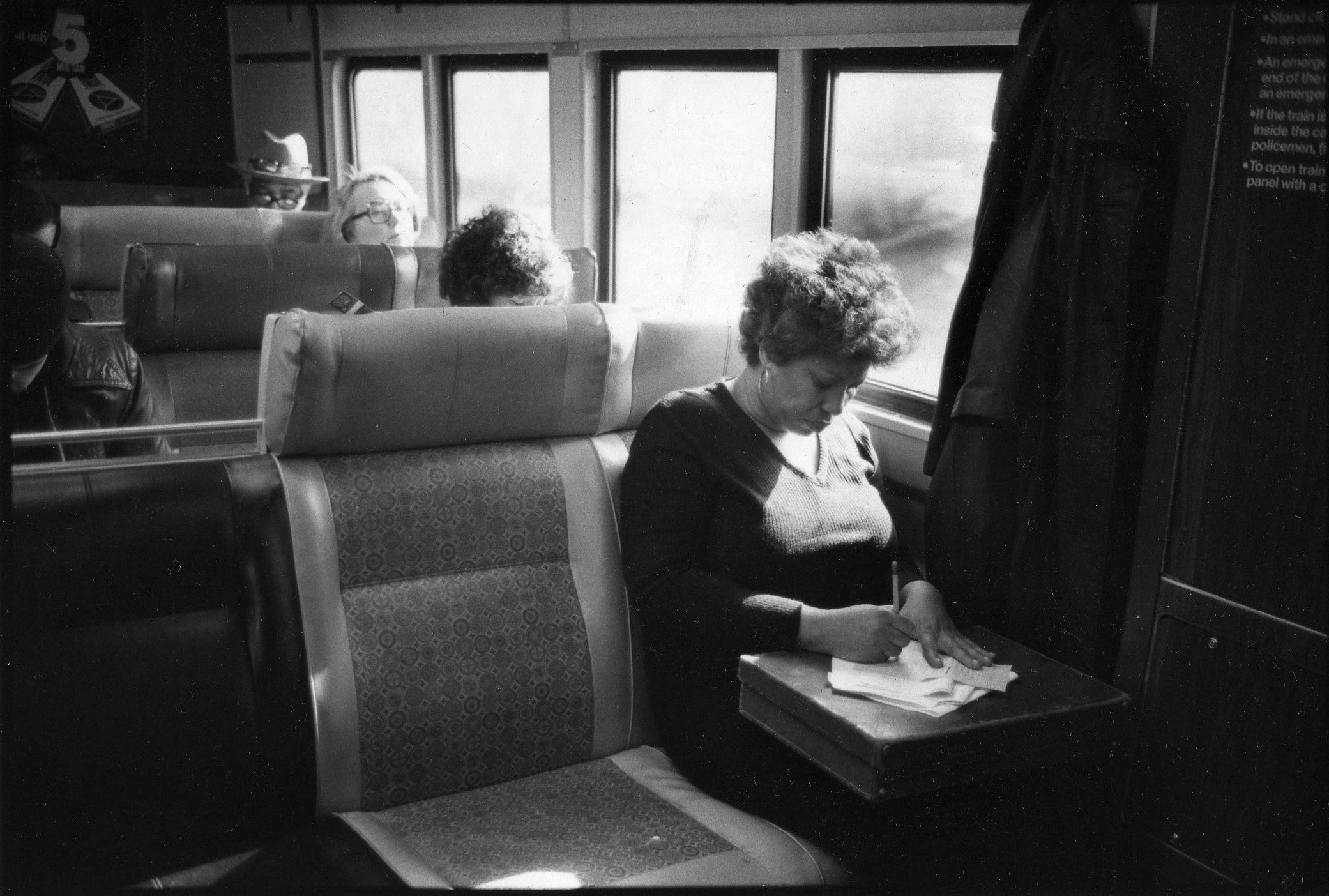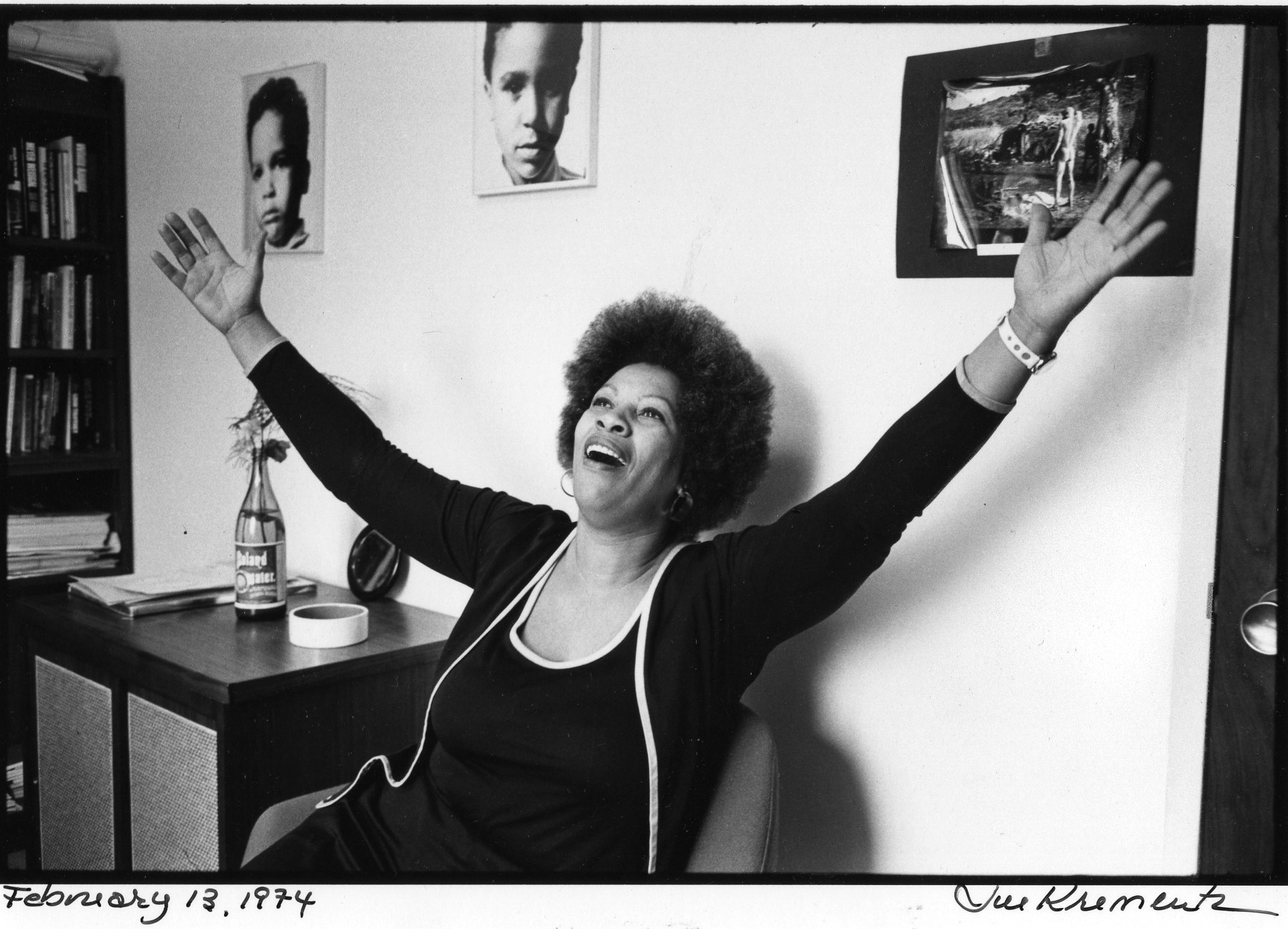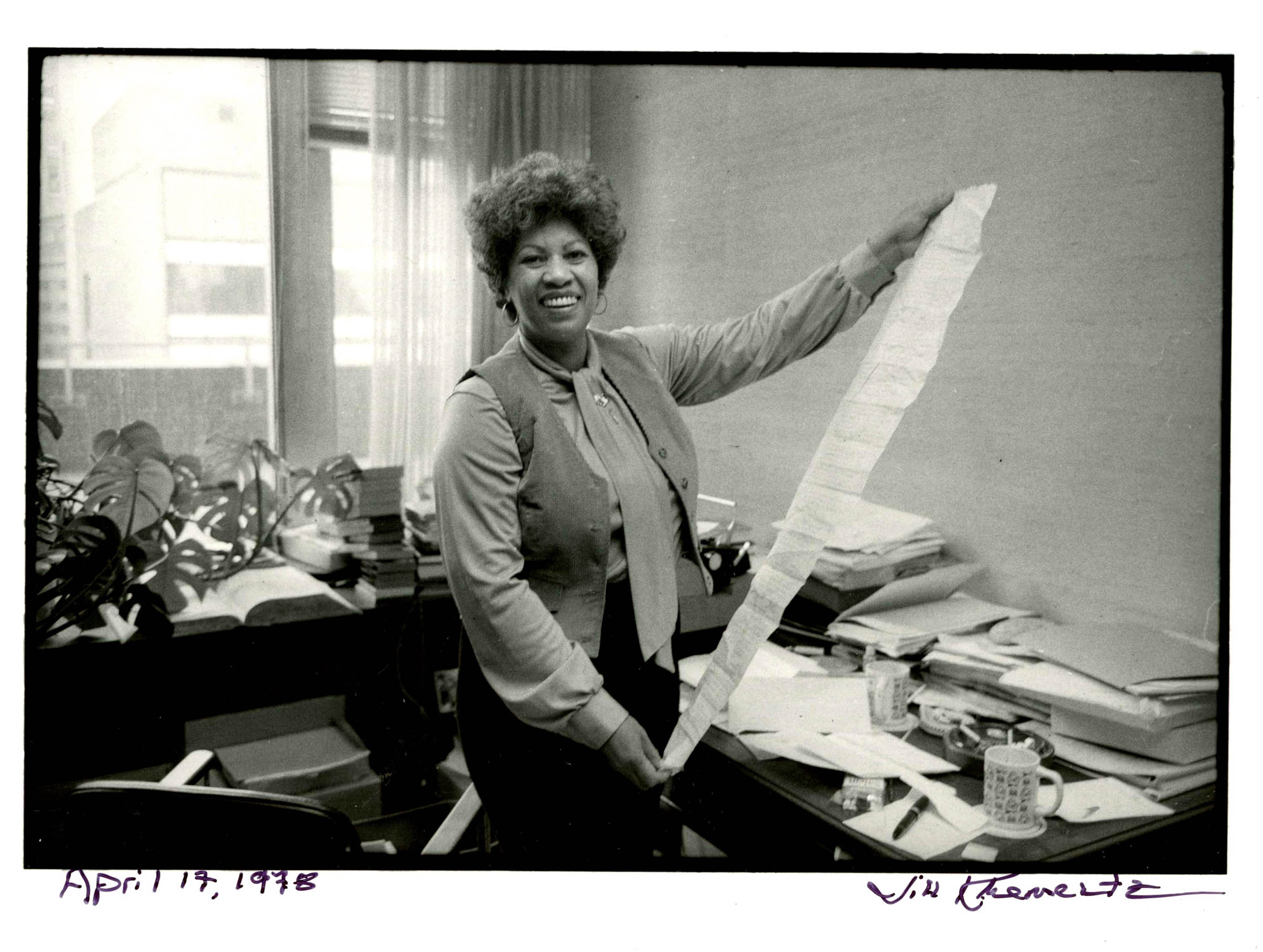I have never been to Lorain, Ohio, but it has been on my bucket list for 20 years at least. I’m curious about this town, population 64,000, located 120 miles north of Columbus, at the mouth of Black River. One of my students drove across the country, passing through the town with which I was so infatuated. I asked her to bring me back a small sample of dirt. It isn’t rich and loamy, as I imagined it would be. Instead, it is the soft brown of cocoa powder, grainy and dry. Still, I keep it on my writing desk, sealed in a tiny jar that once held baby food. This earth, scooped from the hometown of Toni Morrison is my totem.
Toni Morrison, who died at the age of 88 on Aug. 5, is not the first black woman writer I ever encountered. Morrison’s first novel, The Bluest Eye, begins with an excerpt from the Dick and Jane books, indicting the compulsory whiteness of American education in the 1950s and its sickening effect on children. Born in 1970, I grew up with a steady diet of fiction and poetry by writers who “looked like me.” Dick and Jane were cast to the dustbin in favor of African folktales and the novels of Virginia Hamilton and Mildred Taylor. So, when I read The Bluest Eye as a teenager and was gobsmacked by the sheer genius of the work, it wasn’t because I had never seen myself in a book. It was because I had never read a book this good.
In The Bluest Eye and all of her other work, Toni Morrison writes about ordinary people in such a way that somehow manages to make them mythological without rendering them unrecognizable. Song of Solomon, her breathtaking third novel, opens as an insurance salesman leaps to his death, wearing a set of wings of his own fashioning. In the hands of another writer, this scene could be played for laughs—a crazy man thinks he can fly! Or it could be used to illustrate the hopelessness of Black American life—a man in a soul-stealing, predatory line of work chooses to end it all. But Morrison (who sets this scene at the exact moment of her own birth) renders the doomed salesman as iconic as Icarus, but still manages to work in a laugh line, or two, “Mr. Smith went SPLAT!” I often use these opening pages to show my students that a master novelist can condense the entire novel into an intense first chapter that goes down hot and strong like a good whiskey. The more than 300 pages that follow are the intoxicating effects of that first powerful experience.

Morrison’s characters live with me the way that biblical figures were always in the back of my grandmother’s mind when she needed to make a point. As Grandmother might say, “Remember Job” or “Don’t forget when Ezekiel saw the wheel,” so I spouted the cautionary tales abounding in Morrison’s novels. There is Eva Peace, in the novel Sula, who set her drug-addicted son afire after she dreamed he was trying to climb back into her womb. At the funeral of her best friend, Nel realizes that all these years it was Sula she missed, not the husband with whom Sula had an affair. No woman wants to be like Hagar, whom her lover likens to the “third beer,” the one you drink just because it’s there. And then there are the great loves. Grandmother had Ruth and Boaz, and I had Paul D, who treasures Sethe because she is a “friend of [his] mind.” Has there even been a commitment deeper than that of Sixo’s with the “Thirty-Mile Woman,” so named because this is how far he travels on foot to see her for a brief visit before returning home to the plantation where he is enslaved.
My favorite song in the Baptist hymnal is “May the Work I’ve Done Speak for Me.” As we remember Toni Morrison, I believe this should be engraved upon her tombstone. Ms. Morrison didn’t peddle her personality, performing the role of a great writer, yet she was the most formidable mind of our times. She is best known as the author of 11 astonishing novels, garnering the many laurels on which she refused to rest. She also penned works of non-fiction, some of which are so dense, intricate, and sometimes even ruthless as she confronts racism and its collateral effects on society. Yet this was not her entire contribution to the world of letters. She worked as an editor at Random House, midwifing landmark works. She edited Gayl Jones, Angela Davis and Toni Cade Bambara. She compiled The Black Book, which in the 1970s my parents displayed just beside the complete set of Encyclopedia Britannica. Between the two of them, there was a sense that the entire world of knowledge rested on a single shelf.
Morrison labored tirelessly, and she theorized about her efforts, leaving for us a road map of sorts.
After the re-election of George W. Bush in 2004, she wrote:
This is precisely the time when artists go to work. There is no time for despair, no place for self-pity, no need for silence, no room for fear. We speak, we write, we do language. That is how civilizations heal.
I know the world is bruised and bleeding, and though it is important not to ignore its pain, it is also critical to refuse to succumb to its malevolence. Like failure, chaos contains information that can lead to knowledge—even wisdom. Like art.

Of course this seems quaint during these dark days, despairing at the idea of a second Bush term, but these words may serve as an urgent gift to us now as was are facing moral crisis like none I have witnessed in my lifetime. Although her art and artistry is singular in such a way that it could exist only for the sake of its own beauty, she understood that her work—and all of our work—must be applied in pursuit of a world that is more just, more fair and more humane. All of her novels center on the lives of people who struggle to find their place in a country that doesn’t always afford them true ownership on the land upon which they stand, the soil in which they find themselves rooted. They are treated like unwelcome but necessary tenants, that America requires in order to function. Morrison didn’t just tell these stories of these people—her people, our people, us—she elevated them.

As I struggle to end this remembrance, I am fiddling with the jar on earth on my desk. I have developed a habit of shaking it and letting my mind wander. Today I am thinking of The Bluest Eye and how it begins with a discussion of dirt and marigolds that didn’t grow. I’m looking at this sample of the dry Midwestern soil that sprouted our great American genius, and I am grateful for the life she lived and the language she left behind. I will close with her own words, a simple phrase uttered by a grieving grandmother, Pilate in Song of Solomon, so deeply spiritual that she is almost super-natural, but even she could not prevent the inevitability of death. Of her granddaughter, she proclaimed to anyone within hearing, the same words so many of us are whispering as we remember Toni Morrison: She was loved.
More Must-Reads From TIME
- The 100 Most Influential People of 2024
- The Revolution of Yulia Navalnaya
- 6 Compliments That Land Every Time
- What's the Deal With the Bitcoin Halving?
- If You're Dating Right Now , You're Brave: Column
- The AI That Could Heal a Divided Internet
- Fallout Is a Brilliant Model for the Future of Video Game Adaptations
- Want Weekly Recs on What to Watch, Read, and More? Sign Up for Worth Your Time
Contact us at letters@time.com